The epic end to Christopher Nolan’s Dark Knight trilogy that many will seek. Yet it will also leave other long-term followers with mixed emotions as the saga comes to a conclusion.
[stextbox id=”grey” caption=”The Dark Knight Rises (2012)” float=”true” align=”right” width=”200″]
Director: Christopher Nolan
Writers: Jonathan Nolan, Christopher Nolan
Runtime: 165 minutes
Starring: Christian Bale, Tom Hardy, Anne Hathaway, Joseph Gordon-Levitt, Marion Cotillard, Michael Caine, Matthew Modine, Morgan Freeman, Gary Oldman
Distributor: Roadshow
Country: US
Rating (?): Better Than Average Bear (★★★½)
Regardless of how The Dark Knight Rises turned out, the third and final chapter in Christopher Nolan’s set of Batman films comes pre-burdened with expectation. With Batman Begins (2005), Nolan didn’t simply pull one of DC Comics mainstays back from the depths of Joel Schumacher’s camp kistch, but he and screenwriter David S. Goyer redefined the comic book movie for fans and mainstream audiences alike. Paving the way for the massive success of The Dark Knight (2008) and countless imitators, Nolan has left himself in the unenviable position of having to find an ending to something that is bigger than he could have possibly imagined almost half a decade ago.
The final chapter can’t be faulted for a lack of ambition, but the multi-talented Nolan occasionally needs reminding that they are making a Batman film. It has been eight years since the death of District Attorney Harvey Dent, and the world at large believes it was at the hands of the vigilante Batman. Of those who know the truth behind Dent’s villainy, Commissioner Gordon (Gary Oldman) is waning in political favour and billionaire Bruce Wayne (Christian Bale) has become a reclusive shut-in. Yet when cat-burglar Selina Kyle (Anne Hathaway) appears as a Robin Hood figure in Gotham City, just as the infamous mercenary Bane (Tom Hardy) makes his presence known, Bruce realises that he must once again don the mantle of the Bat.
While The Dark Knight was able to gloss over some of its indulgences with the clash of two great villains, with Heath Ledger’s Joker to remain unsurpassed for some time to come, this darker world not only misses that anarchy, but ironically its sense of cohesion as well. The Nolans spend a sometimes ponderous first hour carefully constructing the new Gotham, partly through the eyes of idealist cop Blake (Joseph Gordon-Levitt). This clever delaying of Bruce Wayne and ultimately Batman’s appearance make their inevitable entrances all the more pleasurable, but it is all smoke and mirrors. Absent from the screen for much of the second act, Nolan asks us to sit through an hour or so of board room meetings, police drama, somewhat forced commentary on the ‘Occupy’ movement and villainous planning before we return to the title fight. Of the three different types of film that Nolan was getting out of his system, the only one that truly satisfies is that of Bruce Wayne’s redemption.
The action, however, is truly magnificent and The Dark Knight Rises builds towards one of the most intense final thirty minutes to ever grace the screen. Yet is also so crammed full of activity that it falls into the fatal flaw of trying to slot in all the fan favourites prior to the series end. By rights, Catwoman doesn’t even need to exist in this story, with Marion Cotillard’s mysterious Miranda Tate providing a more than ample love interest for Bruce Wayne. Hathaway and her criminally underused sidekick Juno Temple are often auditioning for their own spin-off. Indeed, it is actually Gordon-Levitt who provides the worthy companion to the Bat, along with the emotional and dramatic core. Other favourites, including Gary Oldman and Michael Caine, are virtually sidelined. The unavoidable white elephant in the room is Bane’s voice. In comic lore, Bane is the man that broke the Bat, yet from the moment he opens his mouth, or rather doesn’t, his vox-box pitches a comical whine that disguises any of Hardy’s natural charisma.
The Dark Knight Rises is exactly how one would expect a saga as sprawling as Nolan’s to end, Hans Zimmer’s score operatically drowning out any naysayers in its knee-trembling wake. Shot with large chunks in IMAX, it is the kind of storytelling that demands an over-the-top showcase of those wonderful Bat-toys. Overlong, overblown and over-saturated, taken on its own, The Dark Knight Rises is not the conclusion the series deserved, but perhaps the one it needed. Regardless, when held up together with its predecessors, Nolan’s films form a visionary cinematic realisation of an iconic character that will unmatched for years to come.
The Dark Knight Rises is release in Australia on 18 July 2012 from Roadshow Films.

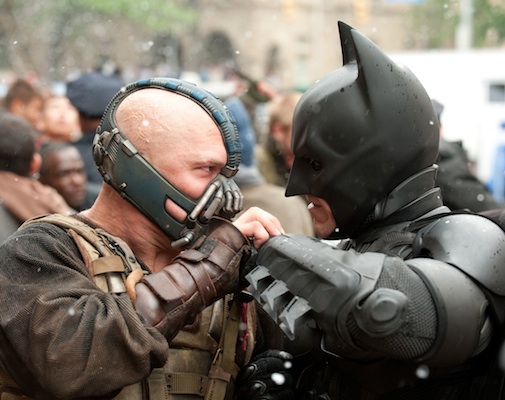
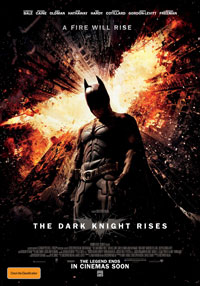
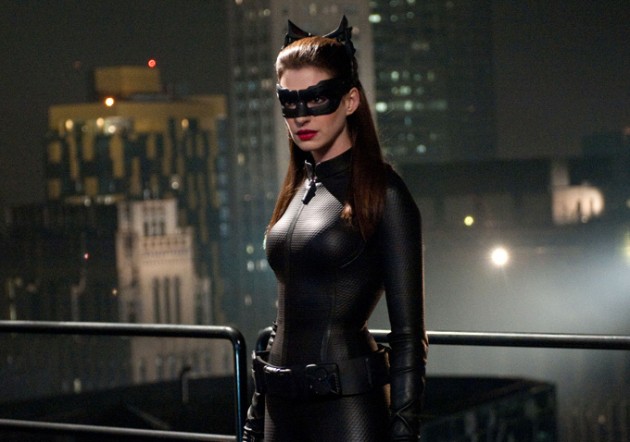
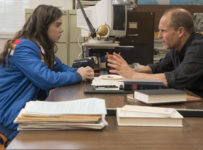

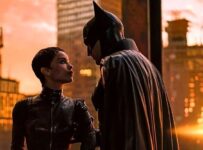
Here
is my spoiler free review. Ok so long story short DKR pretty much
fixes all the criticisms I had of the Dark Knight, this is a film which
brings the focus back to Batman giving him and the franchise the
resolution they both deserve. The script at least to me felt much
tighter and didn’t drag. The performances are solid, as far as which
Cat woman is the best I’m going to say that they are both brilliant and
radically different takes on the same character. Bane’s voice is
perhaps a little too loud for my liking and feels like it needs the
volume turned down ever so slightly and honestly that’s probably my
biggest gripe with the film. I did have a suspicion as to how the film
would end and I was about 90% correct. I haven’t said how I thought it
would end online so don’t bother reading through old comments. Visually
this film can not be faulted and it is a spectacle that needs a large
cinema screen or Imax screen to fully appreciate. Now this brings me to
the two inevitable questions, 1) Is this the best film in the series
and 2) Is Bane the best villain we’ve had? I’ll answer this with Yes
and No. Bane is a solid villain and feels like a better match for
Batman, however Joker is the more entertaining character on screen, what
Bane does do is challenge Batman in a way that makes Dark Knight look
like a game of paintball. So in short this is probably going to be in
almost everyone’s top five films for the year and in many cases number
1. I’m giving it 9.5/10 based on the initial viewing and leave you with
one last remark, Fuck Spiderman this is how you do a dark gritty
Superhero film you tossers.